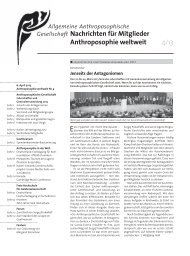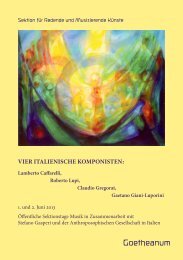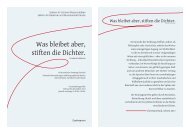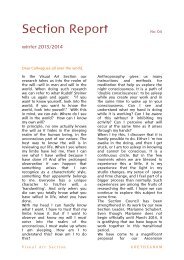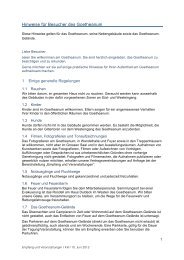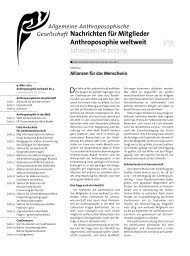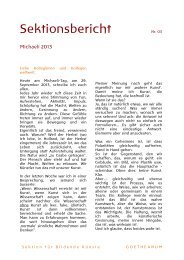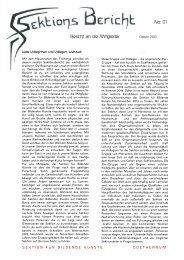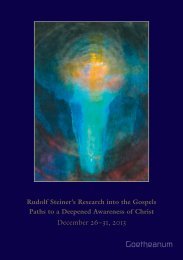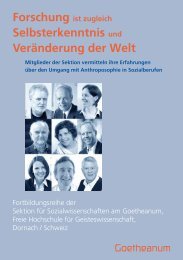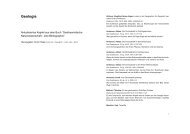The Bees, Creators of Relationships - Goetheanum
The Bees, Creators of Relationships - Goetheanum
The Bees, Creators of Relationships - Goetheanum
Create successful ePaper yourself
Turn your PDF publications into a flip-book with our unique Google optimized e-Paper software.
Agriculture Conference –<br />
Annual International Conference<br />
<strong>of</strong> the biodynamic movement<br />
5 th – 8 th February 2014 at the <strong>Goetheanum</strong><br />
<strong>The</strong> <strong>Bees</strong>, <strong>Creators</strong> <strong>of</strong> <strong>Relationships</strong><br />
<strong>The</strong> nature<br />
<strong>of</strong> the bee<br />
<strong>Bees</strong> and<br />
relationships<br />
Programme<br />
Living with bees<br />
Wednesday, 5 th February<br />
Thursday, 6 th February<br />
Friday, 7 th February<br />
Saturday, 8 th February<br />
10 a.m. onwards<br />
Registration at Reception<br />
11.30 a.m. – 12.30 noon<br />
For members <strong>of</strong> the School <strong>of</strong><br />
Spiritual Science<br />
Class Lesson 16 read by<br />
Brigitte von Wistinghausen<br />
2.30 p.m.<br />
Reception <strong>of</strong> participants in<br />
language groups<br />
Place: see Conference Reader<br />
3 p.m. Opening<br />
Thomas Lüthi (German)<br />
Lecture<br />
How did Rudolf Steiner work? –<br />
From the bee lectures 1923 to<br />
the Agriculture Course 1924<br />
Ueli Hurter (German)<br />
4.45 p.m. Break<br />
5.30 p.m. Lecture<br />
<strong>The</strong> bee colony – nature<br />
and appearance<br />
Thomas Radetzki (German)<br />
6.30 p.m. Supper<br />
8 p.m.<br />
Lecture<br />
Learning to read in the book <strong>of</strong><br />
nature with the bees – from the<br />
Ephesian mysteries to the present<br />
Marco Bindelli (German)<br />
Short musical ending<br />
Marco Bindelli<br />
Nightcafé at the Speisehaus<br />
8.30 a.m. Michael Letter:<br />
„<strong>The</strong> freedom <strong>of</strong> man and<br />
the age <strong>of</strong> Michael“<br />
Jean-Michel Florin (German)<br />
<strong>The</strong> nature <strong>of</strong> the bee<br />
9.15 a.m.<br />
Keynote speech<br />
Michael Weiler (German)<br />
9.45 a.m. Break<br />
10.30 a.m. – 12.15 noon<br />
<strong>The</strong>matic workshops<br />
12.30 noon Lunch<br />
2 – 3 p.m.<br />
Artistic courses<br />
Guided tours<br />
3.15 p.m.<br />
Pr<strong>of</strong>essional and thematic<br />
group meetings*<br />
4.30 p.m. Break<br />
5.15 p.m.<br />
Experiential sketches<br />
Estebán Acosta Pereira (Spanish)<br />
Heidi Herrmann (English)<br />
Thierry Bordage (French),<br />
Sabrina Menestrina (Italian)<br />
6.30 p.m. Supper<br />
8 p.m.<br />
Violin concert<br />
Fanny Paccoud,<br />
Hansheinz Schneeberger<br />
Nightcafé at the Speisehaus<br />
Simultanübersetzung auf Deutsch<br />
Simultaneous translation into English<br />
Traduction simultanée en français<br />
Traducción simultánea al español<br />
Traduzione simultanea in italiano<br />
<strong>Bees</strong> and relationships<br />
8.30 a.m. Michael Letter:<br />
„<strong>The</strong> freedom <strong>of</strong> man and<br />
the age <strong>of</strong> Michael“<br />
Jean-Michel Florin (German)<br />
9.15 a.m.<br />
Keynote speech<br />
Peter Brown (English)<br />
9.45 a.m. Break<br />
10.30 a.m. – 12.15 noon<br />
<strong>The</strong>matic workshops<br />
12.30 noon Lunch<br />
2 – 3 p.m.<br />
Artistic courses<br />
Guided tours<br />
3.15 p.m.<br />
Pr<strong>of</strong>essional and thematic<br />
group meetings*<br />
4.30 p.m. Break<br />
5.15 p.m.<br />
Experiential sketches<br />
Binita Shah (English)<br />
Thomas van Elsen (German)<br />
<strong>The</strong>a Clostermann (German)<br />
Marie-Christine Favé (French)<br />
Gunther Hauk (English)<br />
6.30 p.m. Supper<br />
8 p.m.<br />
Folk music with Simili<br />
Nightcafé at the Speisehaus<br />
8.30 a.m. Michael Letter:<br />
„<strong>The</strong> freedom <strong>of</strong> man and<br />
he age <strong>of</strong> Michael“<br />
Jean-Michel Florin (German)<br />
9.15 a.m.<br />
Keynote speech<br />
Michael Thiele (English)<br />
9.45 a.m. Break<br />
10.30 a.m. – 12.15 noon<br />
<strong>The</strong>matic workshops<br />
12.30 noon Lunch<br />
2 – 3.15 p.m.<br />
Experiential sketches<br />
Kerry Jehanne (English)<br />
Sabine Wendt (German)<br />
Albert Muller (English)<br />
Clifford Kunz (German)<br />
Peter Piechotta (German)<br />
Living with bees<br />
3.30 p.m.<br />
Lecture<br />
What makes us want to live with<br />
bees<br />
Johannes Wirz German)<br />
Closure<br />
Thomas Lüthi (German)<br />
7 p.m. onwards<br />
Festive evening<br />
with the Trio Weliona<br />
* Further details can be found on our Homepage:<br />
www.sektion-landwirtschaft.org<br />
Wir laden Sie alle ganz herzlich zur kommenden Landwirtschaftlichen Tagung am <strong>Goetheanum</strong> ein!<br />
Dieses Jahr wird die Landwirtschaftliche Tagung in der Intimität der Schreinerei am <strong>Goetheanum</strong><br />
stattfinden. In diesem Raum hat Rudolf Steiner vor 90 Jahren über die Bienen gesprochen. Im<br />
Eröffnungsvortrag wird von dieser historischen Situation ausgegangen, um das 90-jährige Jubiläum<br />
des Landwirtschaftlichen Kurses in Koberwitz, das wir im Jahr 2014 begehen, zu thematisieren.<br />
In den Bienenvorträgen von 1923 machte Rudolf Steiner auf die Folgen der Industrialisierung der<br />
Imkerei aufmerksam. Heute leben wir mit den Konsequenzen: die Bienen sind gefährdet. Viele<br />
Menschen fühlen sich davon betr<strong>of</strong>fen. Rührt diese Betr<strong>of</strong>fenheit daher, dass die Menschen sich<br />
um die Bestäubung der Nahrungspflanzen sorgen? Oder haben wir eine intime Ahnung, dass die<br />
Bienen viel mehr sind und bedeuten?<br />
Ausgehend von der Bedeutung der Bienen in den antiken Mysterien und den Vorträgen Steiners<br />
werden wir an der Landwirtschaftlichen Tagung eine breite Palette von Aspekten des Wesens Biene<br />
und seiner Beziehung zur Umgebung kennenlernen, vertiefen und verinnerlichen. Wir gehen<br />
grundsätzlichen Fragen nach wie: Was ist das Wesen der Biene? Warum wurde dieses Insekt seit<br />
Urzeiten geehrt? Welche Rolle haben die Bienen im Haushalt der Natur? Auch wenden wir uns<br />
praktischen Fragen und Gesichtspunkten zur Bienenhaltung sowie Aspekten der Anwendung der<br />
Bienenprodukte in Nahrung und Medizin zu.<br />
Die Tagung wird mit Vorträgen, interaktiven Workshops, künstlerischen Kursen, Fachgruppen und<br />
Erlebnisskizzen eine Möglichkeit bieten, in die faszinierende Welt der Bienen einzutauchen. Die<br />
Abende gehören musikalischen Darbietungen, die Seelennahrung für die Nacht sein können. Wie<br />
letztes Jahr werden sich Berufs- und Fachgruppen der weltweiten biodynamischen Bewegung<br />
während der Tagung und innerhalb der internationalen Konferenz der biodynamischen Bewegung<br />
treffen können.<br />
Durch die Vertiefung dieses <strong>The</strong>mas und durch die vielfältigen Begegnungen der grossen Tagungsgemeinschaft<br />
wollen wir dazu beitragen, den Bienen einen Platz im Herzen unserer Höfe, unserer<br />
Landschaften und der Menschen zurückzugeben.<br />
UELI HURTER JEAN-MICHEL FLORIN THOMAS LÜTHI<br />
Wegen Umbauarbeiten im Grossen Saal des <strong>Goetheanum</strong> findet die Tagung in der Schreinerei<br />
am <strong>Goetheanum</strong> statt. Dadurch wird die Teilnehmerzahl auf 500 beschränkt sein.<br />
Referenten / Contributors<br />
Marco Bindelli Diplommusiker, Leiter des Freien Jugendseminars Stuttgart / Musician, leader<br />
<strong>of</strong> the Youth Seminar in Stuttgart; DE<br />
Peter Brown Vorsitzender Biodynamischer Verein Grossbritannien, Imker / Chairman<br />
Biodynamic Ass. Great Britain; GB<br />
Jean-Michel Florin Leitung Sektion für Landwirtschaft am <strong>Goetheanum</strong>, Koordinator<br />
Biodynamischer Verein FR / Leader <strong>of</strong> the Section for Agriculture at the <strong>Goetheanum</strong>, coordinator<br />
Biodynamic Association France; FR<br />
Ueli Hurter Leitung Sektion für Landwirtschaft am <strong>Goetheanum</strong>, Landwirt, Ferme L'Aubier /<br />
Leader <strong>of</strong> the Section for Agriculture at the <strong>Goetheanum</strong>, farmer at Ferme L'Aubier; CH<br />
Thomas Lüthi Leitung Sektion für Landwirtschaft am <strong>Goetheanum</strong>, verantwortlich für<br />
biodynamische Teilzeitausbildung in Järna / Leader <strong>of</strong> the Section for Agriculture at the <strong>Goetheanum</strong>;<br />
responsible for the biodynamic part time education in Järna; SE<br />
Thomas Radetzki Imkermeister, Vorstand Mellifera e.V. / Beekeeper, chair <strong>of</strong> Mellifera e.V.; DE<br />
Michael Thiele Imker, Ausbilder, aktiv in Gaia <strong>Bees</strong> / Apiculturist, trainer, active in Gaia<br />
<strong>Bees</strong>; USA<br />
Michael Weiler Vorträge/Kurse zum <strong>The</strong>ma Bienenwesen und praktische Bienenhaltung.<br />
Mitarbeit für die Richtlinien zur Ökologischen Imkerei und zur Demeter-Bienenhaltung / Lectures on<br />
the nature <strong>of</strong> bees and on beekeeping. Collaborator in the development <strong>of</strong> the standards for Demeter<br />
and for ecological beekeeping; DE<br />
Johannes Wirz Molekularbiologe und Imker, Naturwissenschaftliche Sektion am <strong>Goetheanum</strong> /<br />
Molecular biologist and bee-keeper, Science Section at the <strong>Goetheanum</strong>; CH<br />
Erlebnisskizzen / Experiential sketches<br />
Estebán Acosta Pereira, Agraringenieur, Imker, Berater / farmer, beekeeper, consultant; CR<br />
Thierry Bordage, Landwirt und Imker, Ausbilder biodynamische Ausbildung Frankreich / farmer<br />
and beekeeper, teacher at the biodynamic training France; FR<br />
<strong>The</strong>a Clostermann, Sozialpädagogin, Bothmergymnastik, 20 Jahre biologisch-dynamischer<br />
Obstbau, Imkererfahrung / social paedagogue, teacher <strong>of</strong> Bothmer gymnastics, 20 years biodynamic<br />
fruit grower, bee-keeper; DE<br />
Thomas van Elsen, Landschaftsökologe / landscape ecologist, PETRARCA; DE<br />
Marie-Christine Favé, Tierärztin, salutogenetische Tiermedizin und Züchtungsarbeit / veterinary,<br />
salutogenetic approch to animal health and breeding work; FR<br />
Gunther Hauk, Autor, Ausbilder und Mitbegründer von „<strong>The</strong> Spikenard Farm, Inc.“ / author,<br />
educator and co-founder <strong>of</strong> „<strong>The</strong> Spikenard Farm, Inc.“; USA<br />
Heidi Herrmann, Gründerin von Natural Beekeeping Trust / Founder <strong>of</strong> the Natural Beekeeping<br />
Trust; GB<br />
Kerry Jehanne, <strong>The</strong>rapeutin, Ausbilderin, Imkerin / therapist, educator, beekeeper; USA<br />
Clifford Kunz, Leitender Arzt Ita Wegman Ambulatorium Basel / Head doctor at the Ita Wegman<br />
Ambulatorium Basel; CH<br />
Sabrina Menestrina, Tierärztin, Vorstand Biodynamischer Verein Italien / Veterinary, board <strong>of</strong><br />
Biodynamic Association Italy; IT<br />
Albert Muller, Biologe, Ausbilder Bienenhaltung, Austauschprojekt Uganda / biologist,<br />
beekeeping teacher, project work in Uganda; NL<br />
Peter Piechotta, Gesellschafter der Neuguss mbH; Shareholder <strong>of</strong> Neuguss mbH; DE<br />
Binita Sha, Programmleiterin bei der Organisation Uttarakhand Organic / Program Managerin<br />
at Uttarakhand Organic; IN<br />
Sabine Wendt, Sozialtherapie, Imkerei, Bauernh<strong>of</strong>pädagogik H<strong>of</strong>gemeinschaft Löstrup / social<br />
therapist, beekeeper and work in farm-based pedagogy at the community Löstrup; DE<br />
<strong>The</strong>matische Labore / <strong>The</strong>matic workshops<br />
1. Biene und Wirtschaft / <strong>Bees</strong> and Economics (Deutsch/Englisch – German/English)<br />
Thomas Radetzki (s.o. / see above), Peter Piechotta (s.o. / see above)<br />
2. Biene und Land(wirt)schaft / <strong>Bees</strong> and Agriculture (Deutsch/Englisch –<br />
German/English) Ulrich Hampl (Leitung von Gut Hohenberg, Seminarbauernh<strong>of</strong><br />
der Stiftung Ökologie & Landbau / Manager <strong>of</strong> Gut Hohenberg, the educational farm<br />
<strong>of</strong> the Foundation Ökologie & Landbau; DE), Thomas van Elsen (s.o. / see above)<br />
3. Biene und Pädagogik / <strong>Bees</strong> and Education (Deutsch/Englisch – German/English)<br />
Peter Lange (Dozent für Pädagogischen Gartenbau an der AfaP, Dornach, Gartenbaulehrer, Autor /<br />
We warmly welcome you to the Agriculture Conference at the <strong>Goetheanum</strong>!<br />
This year, the Agriculture Conference will take place in the Carpentry building at the <strong>Goetheanum</strong>.<br />
This is the space in which, 90 years ago, Rudolf Steiner spoke about the bees. <strong>The</strong> opening<br />
lecture will begin with this historical moment and lead up to the 90-year anniversary <strong>of</strong> the<br />
Agricultural Course in Koberwitz, which will be celebrated in 2014.<br />
In the 1923 lectures on bees, Rudolf Steiner drew attention to the consequences that would ensue<br />
as a result <strong>of</strong> the new productivist methods <strong>of</strong> beekeeping. Today, these consequences have<br />
manifested themselves, and bees are now endangered. Many people are touched by the plight <strong>of</strong><br />
the bees. Does this feeling come only from a concern over the pollination <strong>of</strong> food crops? Or do we<br />
have an intimate feeling that bees are much more, and have a far greater meaning?<br />
Starting out with insights into the importance <strong>of</strong> bees in the ancient mysteries and the lectures <strong>of</strong><br />
Steiner, at the Agriculture Conference we will learn, deepen our knowledge and internalise a broad<br />
range <strong>of</strong> aspects regarding the nature <strong>of</strong> the bees and their relationship with the environment. Our<br />
exploration is guided by fundamental questions, such as: What is the nature <strong>of</strong> the bee? Why have<br />
these insects been revered since ancient times? What is the role <strong>of</strong> bees in the balance <strong>of</strong> nature?<br />
We also turn to practical issues and considerations for beekeeping and aspects <strong>of</strong> the application<br />
<strong>of</strong> bee products in food and medicine.<br />
<strong>The</strong> lectures, interactive workshops, artistic courses, thematic group meetings and experiential<br />
sketches <strong>of</strong> the Agriculture Conference will provide an opportunity to immerse ourselves in the<br />
fascinating world <strong>of</strong> bees. <strong>The</strong> musical performances in the evenings can give nourishment for the<br />
soul during the night. As with last year, pr<strong>of</strong>essional and thematic group meetings can be<br />
organised and attended during the conference and as part <strong>of</strong> the international conference <strong>of</strong> the<br />
biodynamic movement.<br />
By deepening our understanding <strong>of</strong> this topic and through the multiple and diverse encounters<br />
within the conference community, we hope to help the bees regain a place in the hearts <strong>of</strong> farms,<br />
landscapes and people.<br />
UELI HURTER JEAN-MICHEL FLORIN THOMAS LÜTHI<br />
Due to construction work in the Main Auditorium <strong>of</strong> the <strong>Goetheanum</strong>, the agriculture Conference will<br />
take place in the Carpentry building. As a result, the number <strong>of</strong> participants will be limited to 500.<br />
Teacher for pedagogical gardening at AfaP, Dornach, gardening teacher, author; CH), NN<br />
4. Biene und Medizin / <strong>Bees</strong> and Medicine (Deutsch/Englisch – German/English)<br />
Clifford Kunz (s.o. / see above), Norbert Poeplau (Imkermeister in der Lehr- und Versuchsimkerei<br />
von Mellifera e.V. / Master beekeeper at the research apiary <strong>of</strong> Mellifera e.V.; DE)<br />
5. Biene weltweit / <strong>Bees</strong> worldwide (Englisch/Spanisch – English/Spanish)<br />
Estebán Acosta Pereira (s.o. / see above), Gunther Hauk (s.o. / see above)<br />
6. Biene und die Kunst / <strong>Bees</strong> and Art (Deutsch/Französisch – German/French)<br />
Laurence Liebenguth (Kunstmalerin / artist; FR)<br />
7. Biene und Sozialtherapie / <strong>Bees</strong> and social therapy (Deutsch/Englisch –<br />
German/English) Kerry Jehanne (s.o. / see above), Dirk-Hinrich Otto (Inhaber Firma<br />
Wachswerk / Owner <strong>of</strong> the company Wachswerk; DE)<br />
8. Das Bienenwesen, die elementare Welt und der Mensch / <strong>The</strong> being<br />
<strong>of</strong> the bee, the elemental world and the human being (Deutsch/Englisch –<br />
German/English) Karsten Massei (Heilpädagoge, Autor, Forschung und Seminarleitung zu<br />
übersinnlicher Wahrnehmung / Curative pedagogue, author, researcher and workshop leader<br />
on supersensible awareness; CH), Michael Weiler (s.o. / see above)<br />
9. Beziehung Biene-Mensch / Human-bee relationship (Deutsch/Französisch –<br />
German/French) Thierry Bordage (s.o. / see above), Elisabeth van Waay (Lehrerin<br />
Fachmittelschule Freiburg, Mitglied Bienengruppe ARB / Teacher at Secondary School Freiburg,<br />
member <strong>of</strong> the bee group <strong>of</strong> ARB; CH)<br />
10. Blühende Stadt und Bienenhaltung / Flowering cities and beekeeping<br />
(Deutsch/Englisch – German/English) Bastiaan Frich (Mitbegründer und Vorstand von „Urban<br />
agriculture Basel“ / Co-founder and board member <strong>of</strong> “Urban agriculture Basel“; CH), Andreas<br />
Pixis (Stadtimker, Ausbilder / urban beekeeper and educator; DE)<br />
11. St. Ambrosius und die Mythologie der Bienen / St. Ambrosius and bee<br />
mythology (Französisch/Italienisch – French/Italian) Sabrina Menestrina (s.o. / see above),<br />
Enrico Zagnoli (Agronom, Veterinär, Imker / agronomist, veterinary and beekeeper; IT)<br />
12. Bienen – Volk – Gesundheit / <strong>Bees</strong> – Colony – Health (Deutsch/Englisch –<br />
German/English) Michael Thiele (s.o. / see above), Martin Dettli (Bienenforschung und Wanderimkerei<br />
/ apicultural research and migratory beekeeping; CH), Johannes Wirz (s.o. / see above)<br />
Künstlerische Kurse / Artistic Groups<br />
13. Eurythmie/Eurythmy (Deutsch – German) Riho Peter-Iwamatsu<br />
14. Eurythmie/Eurythmy (Deutsch/Englisch – German/English) Barbara Derbidge<br />
15. Eurythmie/Eurythmy (Deutsch/Spanisch – German/Spanish) Anna de Millas<br />
16. Eurythmie/Eurythmy (Englisch/Italienisch – English/Italian) Michele Polito<br />
17. Eurythmie/Eurythmy (Deutsch/Englisch – German/English) Rob Schapink<br />
18. Sprachgestaltung/Speech formation (Deutsch – German) Agnes Zehnter<br />
19. Sprachgestaltung/Speech formation (Deutsch/Englisch – German/English)<br />
Franziska Schmidt-von Nell<br />
20. Bothmer-Gymnastik/Spacial Dynamics (Deutsch/Französisch – German/French)<br />
Ursula Schaller<br />
21. Chorsingen/Choral Singing (Multilingual) Maria Rechsteiner<br />
Führungen / Guided tours<br />
Donnerstag<br />
22. Deutsch – German: Garten- und Geländeführung / <strong>The</strong> <strong>Goetheanum</strong> Gardenpark<br />
23. Englisch – English: Allgemeine Führung / General Tour<br />
24. Französisch – French: Menscheitsrepräsentant / Representative <strong>of</strong> humanity sculpture<br />
25. Italienisch – Italian: Allgemeine Führung / General Tour<br />
26. Spanisch – Spanish: Allgemeine Führung / General Tour<br />
Freitag<br />
27. Deutsch – German: Allgemeine Führung / General Tour<br />
28. Deutsch – German: Menschheitsrepräsentant / Representative <strong>of</strong> humanity sculpture<br />
29. Deutsch – German: <strong>Goetheanum</strong>-Bühnen-Sanierung / <strong>Goetheanum</strong> stage redevelopment<br />
30. Englisch – English: Garten- und Geländeführung / <strong>The</strong> <strong>Goetheanum</strong> Gardenpark<br />
31. Französisch – French: Allgemeine Führung / General Tour
Booking Form<br />
<strong>The</strong> bees, creators <strong>of</strong> relationships<br />
Agriculture Conference <strong>of</strong> the Section for Agriculture at the <strong>Goetheanum</strong><br />
from Wednesday, 5 to Saturday, 8 February 2014 – Booking closes: Wednesday, 22 January 2014<br />
Please complete the booking form and mail, fax or email to:<br />
<strong>Goetheanum</strong> Empfang, Postfach, CH-4143 Dornach<br />
Fax + 41 61 706 4446, Tel. + 41 61 706 4444 email tickets@goetheanum.org<br />
Ms <br />
Billing address private address address <strong>of</strong> institution<br />
<br />
Street, n o <br />
<br />
<br />
<br />
<br />
<br />
<br />
<br />
I need translation in English German French Spanish Italian<br />
Workshops 1 st choice, n o nd choice¹, n o rd choice¹, n o <br />
Artistic courses/Guided tours<br />
Artistic courses (6.+7.2.) 1 st choice, n o nd choice¹, n o rd choice¹, n o <br />
or: Guided tours Thurs, 6.2., n o o <br />
Pr<strong>of</strong>essional and thematic groups are to be booked at the information desk during the conference.<br />
Conference ticket with meals (3x lunch, 3x evening meal)<br />
CHF 612 (with sponsorship²) CHF 402 (regular price) CHF 312 (concessions³)<br />
Conference ticket without meals<br />
CHF 480 (with sponsorship²) CHF 270 (regular price) CHF 180 (concessions³)<br />
Breakfast (3x) CHF 45<br />
Group accommodation in Pfadiheim (scouts‘ home) Dornach (breakfast incl.)<br />
Please bring a sleeping bag, limited places<br />
CHF 90 (3 nights from 5 to 8 February 2014) CHF 120 (4 nights from 5 to 9 February 2014)<br />
<br />
Please bring a sleeping bag as well as a sheet, limited places<br />
CHF 30 (3 nights from 5 to 8 February 2014) CHF 40 (4 nights from 5 to 9 February 2014)<br />
Parking at the <strong>Goetheanum</strong> Parking permit: CHF 25<br />
Insurance See cancellation conditions in the General Information<br />
Cancellation insurance (3% <strong>of</strong> the total costs, CHF 5 minimum)<br />
Payment methods<br />
on invoice (only Switzerland and Euro zone)<br />
Credit card (all countries) Visa MasterCard<br />
<br />
I would like to receive the biannual programme <strong>of</strong> <strong>Goetheanum</strong> events (in German).<br />
I agree to the terms <strong>of</strong> payment and cancellation.<br />
<br />
Place, date, signature<br />
on.<br />
If a workshop should be cancelled we supply lists for you to change groups at the beginning <strong>of</strong> the conference.<br />
² Should you be in a position to pay an additional amount, this would help to cover the costs <strong>of</strong> the conference and<br />
support the work <strong>of</strong> the Section for Agriculture.<br />
³ Students, schoolchildren, OAPs, the unemployed, those in training, military or civil service, people with disabilities who<br />
Pro<strong>of</strong> <strong>of</strong> status has to be submitted with your booking form.<br />
Terms and Conditions will be sent on request or can be accessed online at www.goetheanum.org/2289.html.<br />
4LW
General Information<br />
<strong>The</strong> bees, creators <strong>of</strong> relationships<br />
Agriculture Conference <strong>of</strong> the Section for Agriculture at the <strong>Goetheanum</strong><br />
from Wednesday, 5 to Saturday, 8 February 2014<br />
Booking closes: Wednesday, 22 January 2014<br />
Conference fees: with sponsorship²: CHF 480 with meals: CHF 612<br />
regular price: CHF 270 with meals: CHF 402<br />
concessions³: CHF 180 with meals: CHF 312<br />
Conference meals<br />
Conference meals include 3x lunch and 3x evening meal. Breakfast (3x) can be booked separately at<br />
CHF 45. We regret that food intolerances cannot be catered for.<br />
Group accommodation (booking possibility on the booking form)<br />
Pfadiheim (scouts‘ home) Dornach (breakfast incl.)<br />
3 nights from 5–8 February 2014 for CHF 90 or 4 nights from 5–9 February 2014 for CHF 120<br />
Accomodation in shared rooms. Please bring a sleeping bag; limited places<br />
<br />
3 nights from 5–8 February 2014 for CHF 30 or 4 nights from 5–9 February 2014 for CHF 40<br />
Please bring a sleeping bag as well as a sheet; limited places<br />
Parking permit<br />
for the period <strong>of</strong> the conference: CHF 25 (not right next to the <strong>Goetheanum</strong> building). Please display your<br />
disabled badge in your car.<br />
<br />
Credit cards (all countries): <strong>The</strong> full amount due will be charged to your account as soon as your booking<br />
<br />
Invoice (CH/Euro zone): <br />
processed.<br />
Other countries:<br />
Please note that the conference fee must be paid before the conference starts.<br />
Conference tickets: Tickets can be collected at Reception, also if you pay on arrival. We accept cash (Euro<br />
and CHF), VISA, MasterCard, ec-direct and Postcard-Schweiz.<br />
Cancellation: Bookings may be cancelled free <strong>of</strong> charge up to 14 days prior to the begin <strong>of</strong> the conference<br />
(date <strong>of</strong> posting). After that, 50% <strong>of</strong> the conference fee will be charged. Cancellation on the day<br />
when the conference begins or failure to attend are subject to a 100% cancellation fee. Substitutes will be<br />
accepted at no extra cost.<br />
Cancellation insurance: Subject to a payment <strong>of</strong> 3% <strong>of</strong> total costs (CHF 5 minimum) full cancellation<br />
insurance can be taken out to cover illness (including dependent children and partner), job loss and force<br />
majeure.<br />
Data processing:<br />
_____________________________________________________________________________________________________________<br />
Recommended accommodation<br />
Prices are per person per night. Prices for accommodation cannot be guaranteed.<br />
Guest Houses and <strong>Goetheanum</strong> Accommodation<br />
Accommodation bureau rooms from CHF 50<br />
phone +41 61 706 44 45 zimmer@goetheanum.ch<br />
Haus Friedwart<br />
from CHF 75, about 5 min. walk to the <strong>Goetheanum</strong><br />
phone +41 61 706 42 82 www.friedwart.ch<br />
Begegnungszentrum<br />
from CHF 30, about 10 min. walk to the <strong>Goetheanum</strong><br />
phone +41 61 706 42 82 friedwart@goetheanum.ch<br />
<br />
www.goetheanum.org/4283.html



